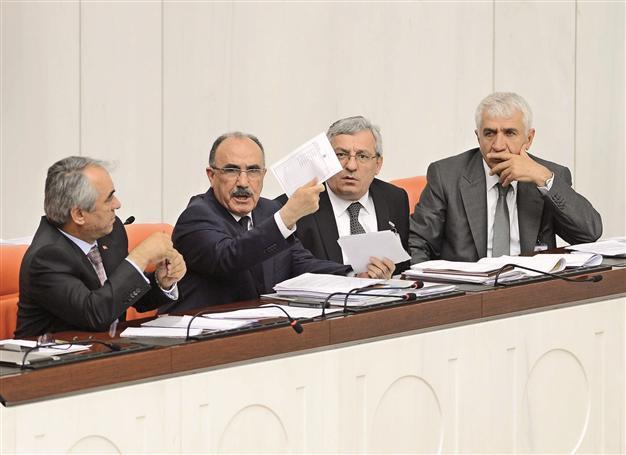Turkish government shapes ‘urgent action plan’ in wake of local polls
Nuray Babacan ANKARA / Hürriyet

Deputy Prime Minister Beşir Atalay (2nd L) submits a report on actions. AA Photo
The Turkish government has determined five priority areas in the wake of the March 30 local polls, placing the fight against corruption and eradicating the parallel structure within the state on the top of the list. These also include measures to provide assurance to Turkey’s Western allies that the democratization process will continue with more reforms.The plan was drafted by a 10-person council established by Prime Minister Recep Tayyip Erdoğan before the local elections with a task to formulate strategies. Led by Deputy Prime Minister Beşir Atalay, the council submitted its report attached with an election analysis to Erdoğan and listed steps that should be taken immediately. The prime minister ordered the implementation of measures after a lengthy meeting with the council on April 7.
Here are some important aspects of the report:
Concrete measures should be taken in the fight against corruption to prove to the people that the government is showing determination in prosecuting corruption claims and that they are not left unanswered in the eyes of public opinion. Legal amendments to strengthen anti-corruption measures for municipalities and public offices should be considered. As a complementary move, legal amendments on providing more transparency and accountability should also be brought about. Regulations to make financing politics, donations and aid to political parties more transparent and controllable should be made immediately.
On issues concerning the damage given to Turkey by the parallel structure (the Fethullah Gülen movement) throughout the local elections, the electorate has developed certain expectations from the government. Among their expectations is breaking the parallel structure’s bonds inside the state and dealing with those who have committed crimes. Steps to nix impressions that Turkey has given up of its aspirations in joining the EU should be taken. Our partners in the EU and the United States should be explained to well that Turkey is sticking to its democratization process and the damage given to its commitments is due to the parallel structure’s actions against a democratically elected government, especially on the eve of local elections.
The local elections’ results are proving the people’s overwhelming support for the ongoing Kurdish peace process. Measures to increase the confidence of the people living in the southeast should be taken along with the democratization reforms.
















